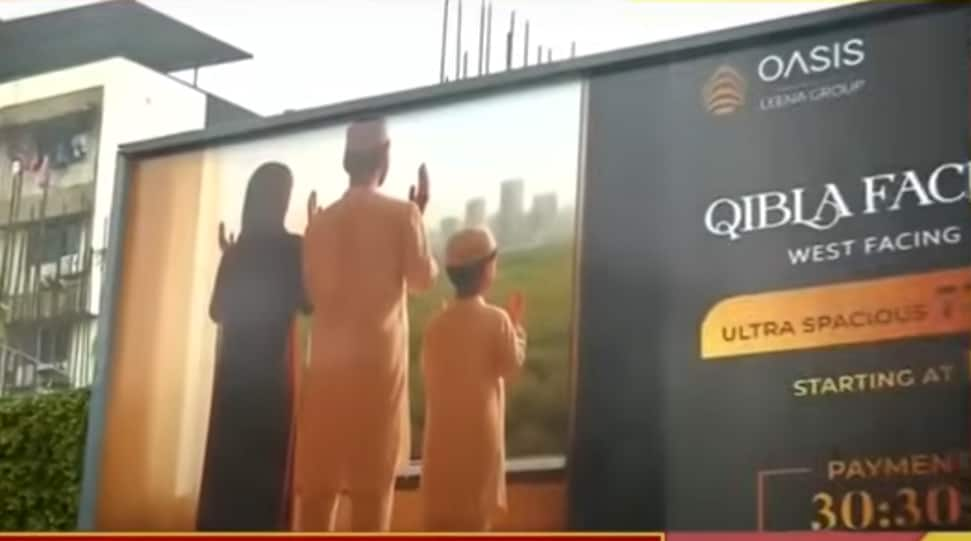Politics
NHRC Issues Notice Over Exclusive Muslim Society in Mumbai

The National Human Rights Commission (NHRC) has formally issued a notice to the Maharashtra government regarding a proposed residential complex exclusively intended for Muslims in the Karjat area of Mumbai. This action comes after a complaint from the Sahyadri Rights Forum NGO, raising concerns about the implications of such a development.
Priyank Kanoongo, a member of the NHRC and affiliated with the Bharatiya Janata Party (BJP), emphasized the seriousness of the situation. He stated that allowing the establishment of a society catering solely to Muslims could suggest a troubling trend of separate settlements based on religion. Kanoongo remarked, “If separate settlements are being built for Muslims in India, in Chhatrapati Shivaji Maharaj’s Maharashtra, this reflects the implementation of the principle of nation within the nation.” He further asserted that the NHRC would not permit this development to proceed unchecked.
Kanoongo’s comments highlight a broader concern regarding communal divisions in India. He questioned how the Maharashtra government granted permission for such a society and has called for a comprehensive report on the matter. “Today, you are claiming that you want houses where only Muslims live. Then one day, you might demand a separate state for Muslims in Maharashtra. This is a serious type of disease,” he stated.
Local organizations have voiced objections to the proposed society, and protests have arisen from members of the Shiv Sena party. The opposition to the project underscores the sensitivity surrounding religious identity and settlement in the region.
Political Dynamics and Controversy
The NHRC’s notice has sparked significant controversy, with some analysts interpreting it as indicative of a clash between the BJP and the Rashtriya Swayamsevak Sangh (RSS). This is particularly relevant given the recent statements made by RSS Chief Mohan Bhagwat during the organization’s centenary celebrations on August 28, 2023. Bhagwat affirmed the presence of Islam in India, stating, “Those who think Islam will be removed from India are not guided by Hindu thought.”
Kanoongo’s vocal stance on issues related to Muslims has drawn mixed reactions. While he has previously supported the Waqf Amendment Act, his remarks have occasionally been perceived as anti-Muslim, contributing to the ongoing discourse about religious harmony in India.
In contrast, Waris Pathan, a leader in the All India Majlis-e-Ittehad-ul-Muslimeen (AIMIM), has defended the need for such a society, highlighting the challenges Muslim tenants face in accessing rental properties in predominantly non-Muslim areas. He noted, “The Constitution provides for equal opportunity and allows every Indian to live peacefully in any part of India without discrimination.”
The situation continues to evolve, reflecting broader societal debates about identity, inclusion, and the interpretation of secularism in India. The NHRC’s intervention signals a commitment to addressing potential human rights violations, while the political ramifications of this issue are likely to unfold in the coming weeks. The future of the proposed society remains uncertain as the Maharashtra government prepares to respond to the NHRC’s inquiries.
-

 World5 months ago
World5 months agoSBI Announces QIP Floor Price at ₹811.05 Per Share
-

 Lifestyle5 months ago
Lifestyle5 months agoCept Unveils ₹3.1 Crore Urban Mobility Plan for Sustainable Growth
-

 Science4 months ago
Science4 months agoNew Blood Group Discovered in South Indian Woman at Rotary Centre
-

 World5 months ago
World5 months agoTorrential Rains Cause Flash Flooding in New York and New Jersey
-

 Top Stories5 months ago
Top Stories5 months agoKonkani Cultural Organisation to Host Pearl Jubilee in Abu Dhabi
-

 Sports4 months ago
Sports4 months agoBroad Advocates for Bowling Change Ahead of Final Test Against India
-

 Science5 months ago
Science5 months agoNothing Headphone 1 Review: A Bold Contender in Audio Design
-

 Top Stories5 months ago
Top Stories5 months agoAir India Crash Investigation Highlights Boeing Fuel Switch Concerns
-

 Business5 months ago
Business5 months agoIndian Stock Market Rebounds: Sensex and Nifty Rise After Four-Day Decline
-

 Sports4 months ago
Sports4 months agoCristian Totti Retires at 19: Pressure of Fame Takes Toll
-

 Politics5 months ago
Politics5 months agoAbandoned Doberman Finds New Home After Journey to Prague
-

 Top Stories5 months ago
Top Stories5 months agoPatna Bank Manager Abhishek Varun Found Dead in Well









